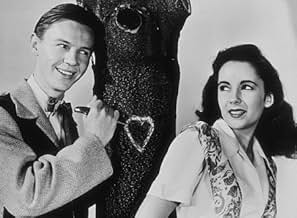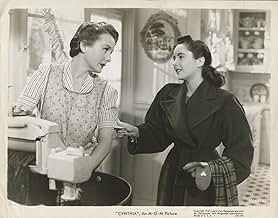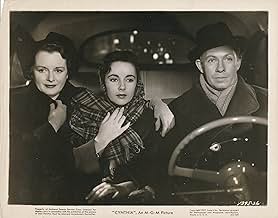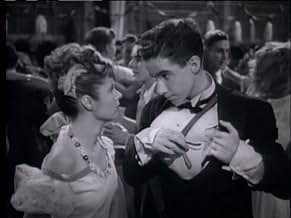Sickly girl finds an outlet in music.Sickly girl finds an outlet in music.Sickly girl finds an outlet in music.
- Awards
- 1 win total
Carol Brannon
- Fredonia Jannings
- (as Carol Brannan)
Erville Alderson
- Dingle Clerk
- (uncredited)
Charles Bradstreet
- Stubby Stubblefield
- (uncredited)
Featured reviews
I came into this film on TCM at 6:15 AM one morning, about 1/4 into it so I missed the opening and establishing of the players backgrounds and motivations, and I did not 'get them' until the denouement. The motivations of the mother and father as well as the uncle as the doctor and his family, are the engine that drive the plot. However, the directors job, once he has a decent story, is to elicit emotion of varying kinds from the audience. If you want to look at and watch Liz Taylor in all her youthful glory and magnetism, this is one of the best. Ironically if forebodes her complete life as a great actress who has health problems all her life. This film took me up and down several times much to my amazement and has a great Hollywood, happy wrap up. (nothing wrong with feeling good especially at 6 A M). Yes, of course there are some problems but I watch films for the way they make me feel in the end, not specifically to be a critic, especially films of this genre and contrived time period. I loved it because it made me feel alive and real!!We all have felt these same emotions in our youth and this well done film allows us feel these once more.
Elizabeth Taylor still a sweet young thing stars in the title role of Cynthia, a teen
thought of as sickly by her over doting parents George Murphy and Mary Astor.
I have to say that Liz looked pretty healthy to me.
A short prologue tells some of the answer. Mary Astor marries big man on campus George Murphy and both as it turns out are planning to study in Vienna, him medicine, her music. But the Great Depression happens and both return to the USA with a baby daughter and worried most of all about security.
I'm sure that the baby in its early years gets doted on and may have had more than her share of illnesses. But the parents develop an overprotective attitude and a hypochondria about her. Which is making Dr. Gene Lockhart who is married to Spring Byington, Astor's sister practically a practice of his own.
Kids do grow out of these things. One of my nieces was very sickly as a child, but she's 32 now and quite healthy. My brother and his wife never developed the attitude that Murphy and Astor have. She was not the hot house geranium that Murphy and Astor have raised.
Lockhart and Byington have a daughter Carol Brannan and Brannan as Liz's cousin thinks of nothing but boys 24/7. There's one special boy in Jimmy Lydon who lied about his age and went to war. Now he's back in high school and seen as the catch of the year.
Lydon never really rings true as a character. He surely doesn't show any of the maturity that one would have after war service. I can't see how he would fit into high school. Just get a GED and go claim your GI benefits would be more realistic. Lydon doesn't seem that much more mature than Scotty Beckett who is Brannan's ever reliable boyfriend and playing awkward as he always did as a teen. Lydon's character is a weakness that the movie Cynthia has.
It's biggest strength is Taylor of course. It's really heart warming to see her emerge from the hot house. Also S.Z. Sakall as a sympathetic music teacher who remembers old Vienna steals every scene he's in as he always does.
Cynthia is a film as old as I am. It's also holding up in far better shape than this author. Elizabeth Taylor's legion of fans will still love it.
A short prologue tells some of the answer. Mary Astor marries big man on campus George Murphy and both as it turns out are planning to study in Vienna, him medicine, her music. But the Great Depression happens and both return to the USA with a baby daughter and worried most of all about security.
I'm sure that the baby in its early years gets doted on and may have had more than her share of illnesses. But the parents develop an overprotective attitude and a hypochondria about her. Which is making Dr. Gene Lockhart who is married to Spring Byington, Astor's sister practically a practice of his own.
Kids do grow out of these things. One of my nieces was very sickly as a child, but she's 32 now and quite healthy. My brother and his wife never developed the attitude that Murphy and Astor have. She was not the hot house geranium that Murphy and Astor have raised.
Lockhart and Byington have a daughter Carol Brannan and Brannan as Liz's cousin thinks of nothing but boys 24/7. There's one special boy in Jimmy Lydon who lied about his age and went to war. Now he's back in high school and seen as the catch of the year.
Lydon never really rings true as a character. He surely doesn't show any of the maturity that one would have after war service. I can't see how he would fit into high school. Just get a GED and go claim your GI benefits would be more realistic. Lydon doesn't seem that much more mature than Scotty Beckett who is Brannan's ever reliable boyfriend and playing awkward as he always did as a teen. Lydon's character is a weakness that the movie Cynthia has.
It's biggest strength is Taylor of course. It's really heart warming to see her emerge from the hot house. Also S.Z. Sakall as a sympathetic music teacher who remembers old Vienna steals every scene he's in as he always does.
Cynthia is a film as old as I am. It's also holding up in far better shape than this author. Elizabeth Taylor's legion of fans will still love it.
"Cynthia" is a must enjoyable and unusual film...and it gives you a chance to see Elizabeth Taylor receive her first onscreen kiss!
When the story begins, Larry and Louise (George Murphy and Mary Astor) fall in love and marry...and have so many wonderful dreams for their future. Sadly, however, they soon have a child...and the child is sickly. As Cynthia (Taylor) grows, her over-protective homelife begins to take its toll. Her uncle is a doctor and he insists on Cynthia living a very sheltered life...and Larry insists that they do whatever his brother-in-law says....even though he and his family are jerks. As for Louise, she is beginning to realize the damage being done to her daughter...as she's in high school and shouldn't miss the things normal kids do. Additionally, she is tired of seeing her husband behaving so spinelessly with his boss and brother-in-law...which creates a schism in the marriage. What's to come of all this? See the film.
"Cynthia" is a great example of the sort of sweet family picture MGM could make during its heyday. Excellent acting, music, direction and a sweet story elevate this 'average' film for the studio into something special.
By the way, IMDB noted it and I was surprised too to see Spring Byington playing a rather hateful person....quite unusual.
When the story begins, Larry and Louise (George Murphy and Mary Astor) fall in love and marry...and have so many wonderful dreams for their future. Sadly, however, they soon have a child...and the child is sickly. As Cynthia (Taylor) grows, her over-protective homelife begins to take its toll. Her uncle is a doctor and he insists on Cynthia living a very sheltered life...and Larry insists that they do whatever his brother-in-law says....even though he and his family are jerks. As for Louise, she is beginning to realize the damage being done to her daughter...as she's in high school and shouldn't miss the things normal kids do. Additionally, she is tired of seeing her husband behaving so spinelessly with his boss and brother-in-law...which creates a schism in the marriage. What's to come of all this? See the film.
"Cynthia" is a great example of the sort of sweet family picture MGM could make during its heyday. Excellent acting, music, direction and a sweet story elevate this 'average' film for the studio into something special.
By the way, IMDB noted it and I was surprised too to see Spring Byington playing a rather hateful person....quite unusual.
All of the reviews seem to be about Elizabeth Taylor, but very little mention about George Murphy and Mary Astor. Murphy almost sleepwalks his way through the film. Sixteen years as a clerk in a hardware store without a raise? Really? Where's the gumption, the backbone in the character. Is Napoleon so small a town that he can't find a better job somewhere else? A better actor would have shown some bitterness as being denied the opportunity to become a doctor. Mary Astor was going to be a concert pianist. Surely these failures of ambition can't simply be blamed on the sickly child that was born to them.
At the height of her film career Elizabeth Taylor was one of the most famous women in the world, and even after she retired from acting she remained famous, largely because of her notoriously complex love-life. And yet there are a surprisingly large number of films on her CV which today are virtually forgotten and which even when first released probably did not arouse a great deal of interest. "Cynthia", dating from 1947 when Taylor was only fifteen, is a case in point.
Cynthia Bishop is a beautiful teenage high school girl from the small town of Napoleon, Illinois. Most of the plot revolves around the point that Cynthia is supposedly physically frail and suffers from health problems and is therefore not allowed to do many of the things that teenage girls normally do, such as attending the school prom. There is also a sub-plot dealing with the frustrated dreams of her parents Larry and Louise, both of whom once dreamed of going to Vienna, Larry to study medicine and Louise to study music. They never, however, realised these ambitions, and today Larry is a badly-paid assistant in a hardware store and Louise a housewife.
The film was based on a play called "The Rich, Full Life", and although I have never seen it- indeed, I had never previously heard of it or of its author, one Viña Delmar- that title seems to sum up the general theme. The idea is that one can still live a rich, full life even if one is an invalid or if one's youthful ambitions have been thwarted. The screenplay, however, does not fully realise the potential of either of the two plotlines, and too much is left unclear. We are never told exactly why Louise and Larry were unable to study in Vienna; the implication is that Louise accidentally became pregnant out of wedlock and that theirs was a shotgun marriage, but in the moral climate of the forties, with the Production Code still in full force, this could not be made explicit. (There is no acknowledgement of the fact that the Vienna of the 1930s, torn by political strife between Nazis, Communists, Socialists and Austro-fascists, might not have been the most congenial place in which to study, nor of the fact that there are perfectly good medical schools and colleges of music in America itself; the "Vienna" of this film is simply a romantic symbol of youthful illusions, not a real-life city).
Cynthia is the title character, and most of the action revolves around her, but the healthy-looking Taylor never makes a convincing invalid. It is never made clear exactly what illnesses Cynthia suffers from, beyond the fact that she tends to catch cold easily- Taylor spends a lot of the film sneezing- or whether her status as an invalid is genuine. It is strongly hinted that she may in fact be the victim of obsessive concern on the part of her over-protective parents, backed up by the local doctor (who also happens to be Cynthia's uncle)- what one might call hypochondria by proxy.
The film-makers never seem quite clear whether they are making a comedy or a serious family drama. The overall theme is a basically serious one, but in many parts, especially those scenes dealing with the rivalry between Cynthia and her insufferable cousin Fredonia, they are obviously aiming for laughs. (Whether they actually achieve them is another matter). Taylor displays both the beauty and the charisma which were later to make her a big adult star, but not unfortunately the talent, and there are no performances of any particular merit from anyone else in the cast. It is not difficult to understand why "Cynthia" is today one of the most obscure entries in Taylor's filmography. 4/10
Cynthia Bishop is a beautiful teenage high school girl from the small town of Napoleon, Illinois. Most of the plot revolves around the point that Cynthia is supposedly physically frail and suffers from health problems and is therefore not allowed to do many of the things that teenage girls normally do, such as attending the school prom. There is also a sub-plot dealing with the frustrated dreams of her parents Larry and Louise, both of whom once dreamed of going to Vienna, Larry to study medicine and Louise to study music. They never, however, realised these ambitions, and today Larry is a badly-paid assistant in a hardware store and Louise a housewife.
The film was based on a play called "The Rich, Full Life", and although I have never seen it- indeed, I had never previously heard of it or of its author, one Viña Delmar- that title seems to sum up the general theme. The idea is that one can still live a rich, full life even if one is an invalid or if one's youthful ambitions have been thwarted. The screenplay, however, does not fully realise the potential of either of the two plotlines, and too much is left unclear. We are never told exactly why Louise and Larry were unable to study in Vienna; the implication is that Louise accidentally became pregnant out of wedlock and that theirs was a shotgun marriage, but in the moral climate of the forties, with the Production Code still in full force, this could not be made explicit. (There is no acknowledgement of the fact that the Vienna of the 1930s, torn by political strife between Nazis, Communists, Socialists and Austro-fascists, might not have been the most congenial place in which to study, nor of the fact that there are perfectly good medical schools and colleges of music in America itself; the "Vienna" of this film is simply a romantic symbol of youthful illusions, not a real-life city).
Cynthia is the title character, and most of the action revolves around her, but the healthy-looking Taylor never makes a convincing invalid. It is never made clear exactly what illnesses Cynthia suffers from, beyond the fact that she tends to catch cold easily- Taylor spends a lot of the film sneezing- or whether her status as an invalid is genuine. It is strongly hinted that she may in fact be the victim of obsessive concern on the part of her over-protective parents, backed up by the local doctor (who also happens to be Cynthia's uncle)- what one might call hypochondria by proxy.
The film-makers never seem quite clear whether they are making a comedy or a serious family drama. The overall theme is a basically serious one, but in many parts, especially those scenes dealing with the rivalry between Cynthia and her insufferable cousin Fredonia, they are obviously aiming for laughs. (Whether they actually achieve them is another matter). Taylor displays both the beauty and the charisma which were later to make her a big adult star, but not unfortunately the talent, and there are no performances of any particular merit from anyone else in the cast. It is not difficult to understand why "Cynthia" is today one of the most obscure entries in Taylor's filmography. 4/10
Did you know
- TriviaA rare nasty role for Spring Byington (Carrie Jannings).
- GoofsThe call letters of the radio station that broadcasts the operetta from the fictional small town in Illinois were, in 1947, really the call letters of a radio station in New York City. It's highly unlikely that an Eastern metropolis would broadcast a high school musical from a Midwestern town.
- ConnectionsFeatured in Il était une fois Hollywood (1974)
- SoundtracksMelody Of Spring
(1947) (uncredited)
Music by Hans Engelmann
Lyrics by Ralph Freed
Performed by Elizabeth Taylor
- How long is Cynthia?Powered by Alexa
Details
- Release date
- Country of origin
- Language
- Also known as
- Cynthia: The Rich, Full Life
- Filming locations
- Production company
- See more company credits at IMDbPro
Box office
- Budget
- $1,318,000 (estimated)
- Runtime1 hour 38 minutes
- Color
- Aspect ratio
- 1.37 : 1
Contribute to this page
Suggest an edit or add missing content





































